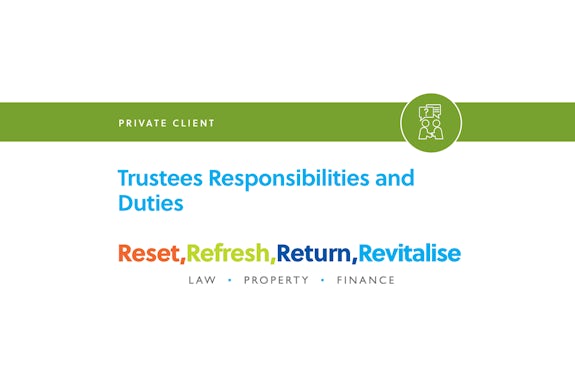
May 22, 2025

The role of the Trustee is a crucial one in administering trusts. The Trustee will hold property for the benefit of the beneficiaries of the trust and must carry out the powers and duties as required by the trust document and by law.
Generally anyone can act as a trustee as long as they are over the age of 16 years and have the mental capacity to do so.
General Duties
Trustees owe a fiduciary duty to the beneficiaries of a trust. That means they must act honestly and in good faith and must not let their personal interests conflict with those of the beneficiaries. There are many general duties that a trustee must fulfil, which are listed below:-
Investment
The duty of the trustee in investing the trust funds is to provide an income for the beneficiaries and to preserve the value of the capital. Generally powers of investment are wide as a trustee may purchase any kind of investment that he sees fit. It is recommended that trustees: –
Before investing any trust funds, trustees must seek advice from a qualified person i.e. a financial adviser.
Review
Trustees should review the trust on a regular basis to ensure all the trust assets are being dealt with in the best manner. In the case of discretionary trusts, the trustees must also consider the needs of the potential beneficiaries at regular intervals. These reviews should be documented and can be used to show the beneficiaries and HMRC that the trust is being correctly administered.
Tax
Trustees should also ensure that HMRC are notified of the existence of the trust (where appropriate), and that the relevant annual trust tax returns are submitted on time, with the tax being paid from the trust assets.
Distribution
Trustees are also responsible for ensuring that trust assets are distributed to the correct beneficiaries and in the correct amounts at the correct times.
If you would like further information on the topic discussed in this blog, please contact Lynne Ragoubi by email: lragoubi@gilsongray.co.uk or by phone: 0141 530 2037. For more information on the Private Client Team, please click here
The information and opinions contained in this blog are for information only. They are not intended to constitute advice and should not be relied upon or considered as a replacement for advice. Before acting on any of the information contained in this blog, please seek specific advice from Gilson Gray.

Lynne is an Accredited Paralegal with the Law Society of Scotland and is part of our Private Client team. She advises clients on a range of matters from Wills and Powers of Attorneys, to trust and IHT planning, and care for the elderly.